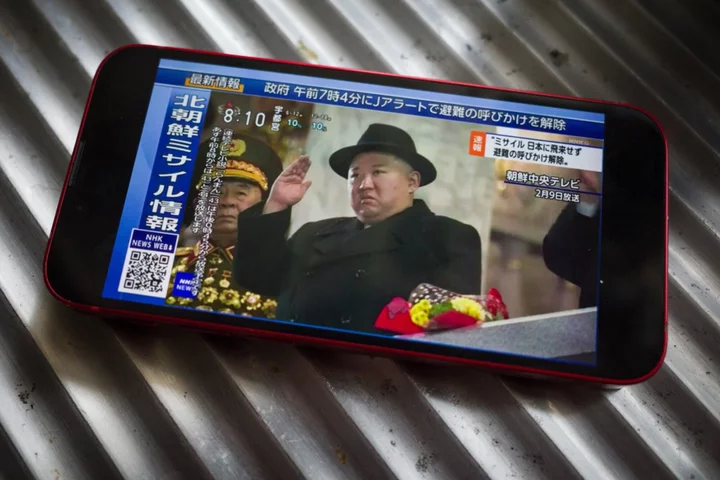North Korea failed for the second time in about three months to put a spy satellite into orbit when its rocket had troubles soon after launch, dealing a blow to Kim Jong Un who wanted a reconnaissance probe to keep an eye on US forces.
North Korea launched a rocket at 3:50 a.m. Thursday in a southward direction that failed a few minutes into flight, South Korea’s Joint Chiefs of Staff said. Parts of the rocket appeared to crash down about 600 kilometers (375 miles) east of the Philippines, Japan’s top government spokesman Hirokazu Matsuno said. Residents in the southern Japanese prefecture of Okinawa were warned to take shelter, according to a tweet from the Japanese prime minister’s office, although the alert was later lifted.
Pyongyang’s state media put out a short dispatch saying “the flights of the first and second stages of the rocket were normal, but the launch failed due to an error in the emergency blasting system during the third-stage flight.”
The report from the official Korean Central News Agency also said the country’s space agency plans a third attempt for a satellite launch in October and will look into the reasons for the failure.
But two consecutive failures to put a satellite into orbit could indicate shortcomings with its space rocket that may take more time to fix. South Korea’s military plans to dispatch a salvage operation to retrieve fallen parts of North Korea’s rocket, Yonhap News Agency reported.
The latest launch coincided with joint military drills by South Korea and the US that run through the end of this month and that prompted Pyongyang this week to issue a threat to retaliate against the exercises it sees as a prelude to invasion.
“In the short-term, Kim may view this second failure as an embarrassment, but in the long-term and in the bigger picture, his country is making steady progress with its nuclear and missile development technology,” said Soo Kim, a former Korea analyst at the Central Intelligence Agency who now works at US-based management consulting firm LMI.
Leader Kim Jong Un has said he wants to put a spy satellite into orbit to keep an eye on US forces deployed in the region. While officials in Seoul believe such a satellite would be rudimentary at best, it could help Pyongyang refine its targeting lists as it rolls out new missiles designed to deliver nuclear strikes in South Korea and Japan, which host the bulk of America’s military personnel in the region.
South Korea, Japan and the US protested the latest launch. The US National Security Council said in a statement the move “is a brazen violation of multiple UN Security Council resolutions, raises tensions, and risks destabilizing the security situation in the region and beyond.”
South Korea’s National Security Council chastised Pyongyang for the launch, saying in a statement that it “deplored the fact that it continues to blame others for its failing economy and ruined civilian life, pushing its people to starvation and death, while squandering its scarce resources on reckless provocations.”
North Korea tried to put a spy satellite into orbit on May 31 in its first space launch in about seven years. That rocket failed when the second stage engine didn’t ignite, sending it plunging into the Yellow Sea.
South Korea salvaged debris in international waters in the Yellow Sea at a depth of about 70 meters. It recovered large parts of the rocket as well as the satellite, giving it a rare direct look at Pyongyang’s capabilities even as it concluded that the technology had little military value.
The Japanese government had received prior notification from North Korea that it intended to launch a satellite between Aug. 24 and Aug. 31, officials said Tuesday. The Japanese Coast Guard was informed of three possible maritime danger zones pertaining to the launch — two west of the Korean Peninsula and the third east of the Philippines’ island of Luzon.
Read more: North Korea Eyes Satellite Launch as US-S.Korea Hold Drills
North Korea is barred by United Nations Security Council resolutions from conducting ballistic missile tests, but Pyongyang has long claimed it’s entitled to a civilian space program for satellite launches. The US and its partners have warned that technology derived from North Korea’s space program could be used to advance its ballistic missiles.
Pyongyang’s space program has diminished in importance over the years as the state greatly enhanced its ability to build intercontinental ballistic missiles capable of carrying nuclear warheads that could strike the US.
North Korea had already fired 24 ballistic missiles so far this year, which included four ICBMs. The country fired off more than 70 ballistic missiles last year, a record for the state.
--With assistance from Se Young Lee, Sangmi Cha, Takashi Hirokawa, Yuki Hagiwara and Yuko Takeo.
(Updates with US comment and salvage operation.)

